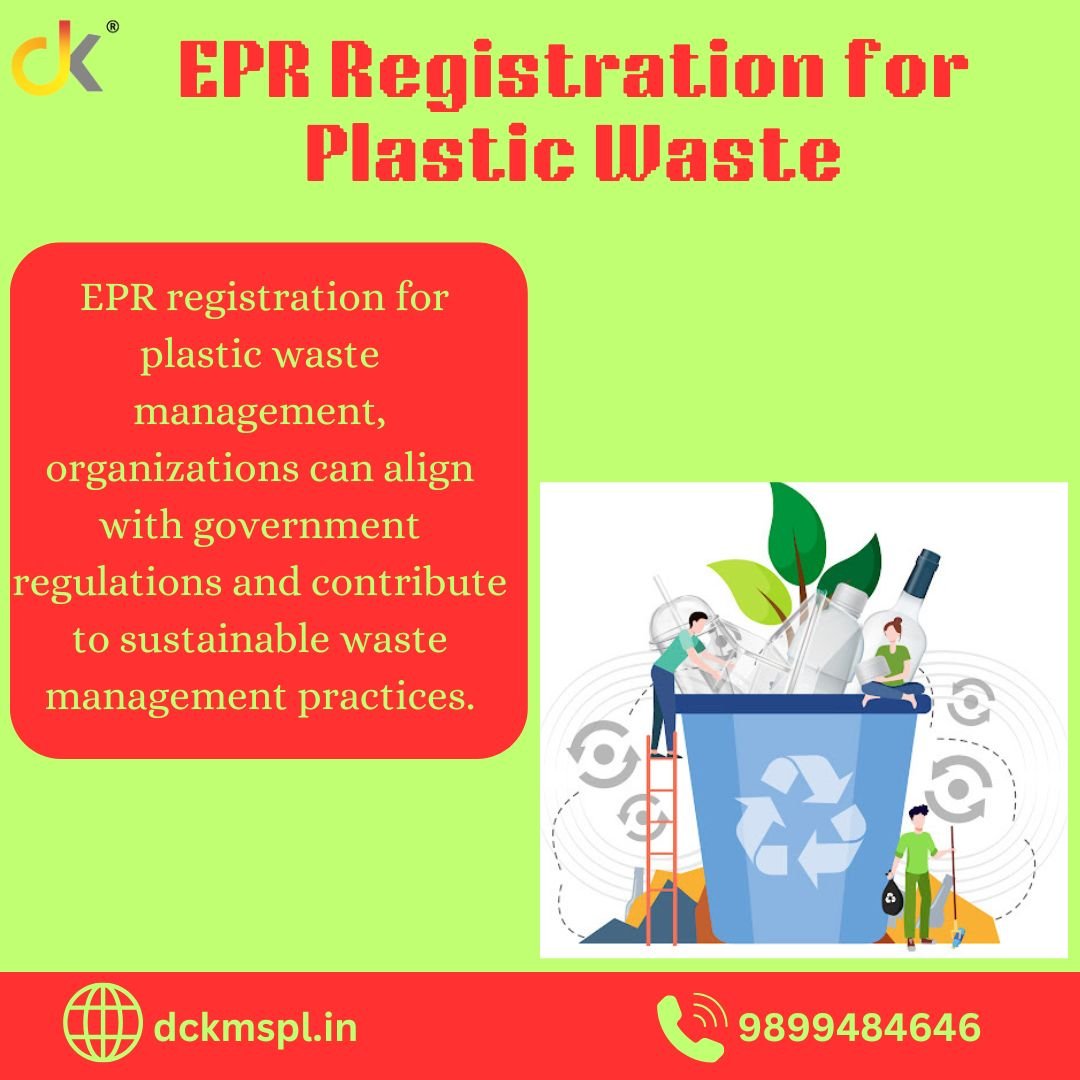Extended Producer Responsibility (EPR) registration is a critical regulatory framework for managing plastic waste in an environmentally sustainable manner. This system places the onus on producers, importers, and brand owners (PIBOs) to take responsibility for the plastic waste generated by their products. As global concerns about plastic pollution intensify, EPR registration has emerged as an essential tool for achieving effective plastic waste management.
What is EPR Registration for Plastic Waste?
EPR registration for plastic waste management is a mandate under environmental regulations, such as India’s Plastic Waste Management Rules, 2016. It obligates businesses involved in the manufacture, import, or use of plastic products to ensure their end-of-life disposal or recycling. The primary aim is to create a closed-loop system that minimizes the environmental impact of plastic waste.
Key Objectives of EPR for Plastic Waste
- Promote Recycling and Reuse: Encourage the recovery and reuse of plastic waste to conserve natural resources.
- Reduce Environmental Pollution: Minimize the harmful effects of plastic pollution on ecosystems.
- Encourage Sustainable Practices: Incentivize producers to adopt eco-friendly packaging and production methods.
- Ensure Accountability: Make producers responsible for the lifecycle of their products, fostering a culture of corporate responsibility.
Why is EPR Registration Important?
EPR registration for plastic waste is crucial for several reasons:
- Environmental Conservation: It mitigates the adverse effects of plastic pollution, preserving biodiversity and ecosystems.
- Regulatory Compliance: Helps businesses align with government regulations, avoiding penalties and reputational damage.
- Circular Economy: Facilitates a shift from a linear “produce-use-dispose” model to a circular economy where waste becomes a resource.
- Social Responsibility: Demonstrates a company’s commitment to sustainable practices, enhancing brand image and customer trust.
The Process of EPR Registration for Plastic Waste
EPR registration involves a series of steps to ensure compliance with the regulatory framework. Here’s a detailed overview:
1. Understanding Applicability
Identify whether your business qualifies for EPR registration. This typically includes:
- Producers manufacturing plastic products.
- Importers bringing plastic-packaged goods into the market.
- Brand owners using plastic for packaging.
2. Documentation Preparation
Prepare essential documents, such as:
- Business registration certificates.
- Details of the plastic products manufactured, imported, or used.
- Annual production or import volumes.
3. Application Submission
Submit an application to the designated government authority, often through an online portal. Ensure accuracy in the provided details to avoid delays.
4. Action Plan Development
Develop an action plan outlining how your business will collect, recycle, or dispose of plastic waste. This plan must align with the country’s plastic waste management regulations.
5. Approval and Certification
Once the application is reviewed and approved, you receive an EPR registration certificate. This certificate is valid for a specific period and must be renewed periodically.
Challenges in EPR Registration
Despite its benefits, EPR registration for plastic waste comes with challenges:
- Complex Regulations: Navigating the regulatory framework can be daunting for businesses unfamiliar with the requirements.
- High Costs: Implementing collection, recycling, or disposal systems may incur significant expenses.
- Lack of Infrastructure: Insufficient recycling facilities in many regions hinder effective waste management.
- Public Awareness: Educating consumers about segregating and returning plastic waste remains a challenge.
Benefits of EPR Registration for Plastic Waste
1. Environmental Benefits
- Reduced Pollution: Proper disposal and recycling reduce environmental contamination.
- Conservation of Resources: Recycling plastic conserves raw materials and reduces energy consumption.
2. Business Benefits
- Regulatory Compliance: Avoid penalties and enhance operational efficiency by adhering to laws.
- Brand Reputation: Showcase a commitment to sustainability, attracting environmentally conscious consumers.
3. Economic Benefits
- Job Creation: The recycling industry generates employment opportunities.
- Cost Savings: Efficient waste management reduces long-term operational costs.
Strategies for Effective EPR Implementation
To maximize the benefits of EPR registration, businesses can adopt the following strategies:
- Collaborate with PROs (Producer Responsibility Organizations): Partnering with PROs can simplify waste collection and recycling efforts.
- Invest in Sustainable Packaging: Reduce the use of virgin plastic by opting for biodegradable or recycled materials.
- Educate Stakeholders: Raise awareness among consumers, employees, and supply chain partners about the importance of plastic waste management.
- Adopt Technological Solutions: Utilize digital platforms to track and manage plastic waste more efficiently.
Global Perspective on EPR for Plastic Waste
Many countries have implemented EPR regulations tailored to their unique waste management challenges. For instance:
- Europe: The European Union’s Packaging and Packaging Waste Directive mandates recycling targets for plastic packaging.
- United States: Several states have introduced EPR laws focusing on plastic waste reduction.
- India: The Plastic Waste Management Rules emphasize EPR compliance for PIBOs, fostering sustainable practices.
The Role of Technology in EPR Compliance
Technological advancements play a pivotal role in streamlining EPR registration and compliance:
- Data Management Tools: Track waste generation, collection, and recycling activities.
- Blockchain Technology: Ensure transparency and traceability in waste management processes.
- Artificial Intelligence: Optimize recycling processes and predict waste generation patterns.
Conclusion
EPR registration for plastic waste is a vital step toward achieving a sustainable future. By holding producers accountable, it fosters responsible consumption and production patterns. While challenges persist, strategic planning, technological adoption, and stakeholder collaboration can pave the way for effective implementation.Businesses that prioritize EPR compliance not only contribute to environmental conservation but also gain a competitive edge in an increasingly sustainability-focused market. Embracing EPR is not just a regulatory requirement; it’s a commitment to preserving the planet for future generations.
